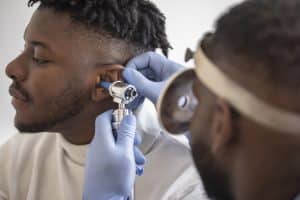You use sensory input from several body parts to help you balance, including the limbs, eyes and ears. However, your vestibular system is primarily located within the inner ear. This is why it’s common to experience both hearing and balance problems at the same time. We review this connection more below.
The Vestibular & Auditory Systems
The inner ear contains many important parts that help you hear and balance:
- The cochlea is a snail-shaped organ that contains tiny hair cells. These cells convert incoming soundwaves into electrical energy that the brain interprets as sound.
- The semicircular canals are filled with fluid that moves as your head rotates and tilts. The fluid causes tiny hair cells to bend, helping your brain detect head movements.
- The utricle and saccule are both otolith organs that contain tiny stones called otoconia. These stones move in response to gravity, telling your brain whether you’re standing up, sitting back or lying down.
All these parts communicate with the brain via the vestibulocochlear nerve. This means if there’s a problem with the nerve, both hearing and balance are impacted. Similarly, if there is damage to one part of the inner ear, the other parts are likely to be affected as well.
Causes of Balance & Hearing Problems
Factors that can damage both the vestibular and auditory systems include:
- Meniere’s disease
- Acoustic neuroma
- Ototoxic drugs
- Prolonged noise exposure
- Aging
- Infections
- Genetic mutations
When to Get a Balance Test
You should get a balance test when the following symptoms interfere with your daily life, including your ability to go for walks at Levy Park:
- Dizziness
- Vertigo
- Feeling unsteady on your feet
- Falling
- Lightheadedness
- Floating sensation
- Blurred vision
- Confusion
- Disorientation
A balance expert, also known as an audiologist, may conduct any of the following tests:
- Electronystagmography (ENT)
- Videonystagmography (VNG)
- Rotation tests
- Video head impulse testing (VHIT)
- Vestibular evoked myogenic potential (VEMP)
- Computerized dynamic posturography (CDP)
These tests in conjunction with your medical history and symptoms should allow your audiologist to determine what balance disorder you have and prescribe the proper treatment.
For more information or to schedule an appointment, call Today’s Hearing today.
